- Home
- L. Ron Hubbard
Mission Earth Volume 1: The Invaders Plan
Mission Earth Volume 1: The Invaders Plan Read online
Also by
L. Ron Hubbard
Buckskin Brigades
The Conquest of Space
The Dangerous Dimension
Death’s Deputy
The End is Not Yet
Fear
Final Blackout
The Kilkenny Cats
The Mission Earth Dekalogy*
Volume 1: The Invaders Plan
Volume 2: Black Genesis
Volume 3: The Enemy Within
Volume 4: An Alien Affair
Volume 5: Fortune of Fear
Volume 6: Death Quest
Volume 7: Voyage of Vengeance
Volume 8: Disaster
Volume 9: Villainy Victorious
Volume 10: The Doomed Planet
Ole Doc Methuselah
Slaves of Sleep & The Masters of Sleep
To the Stars
Triton
Typewriter in the Sky
The Ultimate Adventure
* Dekalogy—a group of ten volumes
Galaxy Press
7051 Hollywood Boulevard
Los Angeles, CA 90028
MISSION EARTH: THE INVADERS PLAN
Copyright © 1985, 1988, 2011 by L. Ron Hubbard. All Rights Reserved.
Any unauthorized copying, translation, duplication, importation or distribution,
in whole or in part, by any means, including electronic copying,
storage or transmission, is a violation of applicable laws.
Mission Earth is a trademark owned by L. Ron Hubbard Library and
is used with permission. Battlefield Earth is a trademark owned
by Author Services, Inc. and is used with permission.
Original cover painting by Gerry Grace.
ISBN 978-1-59212-586-9
This is a work of science fiction, written as satire. The essence of satire is to examine, comment and give opinion of society and culture, none of which is to be construed as a statement of pure fact. No actual incidents are portrayed and none of the incidents are to be construed as real. Some of the actions of this novel take place on the planet Earth, but the characters as presented in this novel have been invented. Any accidental use of the names of living people in a novel is virtually inevitable, and any such inadvertency in this book is unintentional.
See Author's Introduction.
BIBLIOGRAPHY:
Allen, Charles A. and Stephens, George D. Satire: Theory and Practice. 1962.
Brown, Ashley and Kimmey, John L., eds. Satire. 1968.
Duff, J. Wight. Roman Satire: Its Outlook on Social Life. 1936.
Elkin, P. K. The Augustan Defence of Satire.1973.
—. Satire. 1974.
Highet, Gilbert. The Anatomy of Satire. 1962.
Kernana, Alvin B. The Cankered Muse: Satire of the English Renaissance. 1959.
Paulson, Ronald. The Fictions of Satire. 1967.
—, ed. Satire: Modern Essays in Criticism. 1971.
Ramage, Edwin S., Sigsbee, David L. and Fredericks, Sigmund C. Roman Satirists and Their Satire. 1974.
Sutherland, James R. English Satire.1958.
Ulman, Craig Hawkins. Satire and the Correspondence of Swift. 1973.
Worcester, David. The Art of Satire. 1940.
To YOU,
the millions of science fiction fans
and general public
who welcomed me back to the world of fiction
so warmly,
and to the critics and media
who so pleasantly
applauded the novel Battlefield Earth.
It's great working for you!
Contents
Map: Voltar Government Cities
Author's Introduction
Voltarian Censor's Disclaimer
Voltarian Translator's Preface
Part 1
Part 2
Part 3
Part 4
Part 5
Part 6
Part 7
Part 8
Part 9
Part 10
Part 11
About the Author
AUTHOR’S INTRODUCTION
Science Fiction and Satire
A few years ago, I wrote Battlefield Earth to celebrate my golden anniversary as a writer. At nearly a half-million words, it was a bit larger than others I had turned out in my fifty-year career. But, after all, it was my anniversary so I decided to splurge.
It was fun to write and if bestseller lists were any indicator, people found it fun to read. It was also gratifying to know that pure science fiction (as I defined it then) has such a wide audience. It reminded me again of SF’s many facets: adventure, romance, drama, comedy, tragedy and intrigue, with adventure science fiction probably the most dominant type within the genre.
However, there is another aspect to science fiction: by its nature most of it has an element of satire. It has been used by such notables as Mark Twain, Johannes Kepler, Samuel Butler, Jules Verne and Sir Thomas More. This becomes more obvious when the history of satire is examined and compared to science fiction.
Satire is not restricted to the western world. In fact, the Chinese character for the word can be translated as “laughter with knives.” Meanwhile, the origin of our word satire is not as sharp. It comes from the Latin satura which meant “medley” or “mixture” and seems to have been part of the vocabulary of food to describe a hodge-podge assortment, a “mixture full of different things,” such as a bowl of mixed first-of-the-season fruits. The essence of the word seemed to mean a simple dish of a down-to-earth variety that may have been common but it was hearty, healthy, satisfying and fun.
It was quite natural that satura came to be used for the popular, improvised skits that were performed before an undoubtedly boisterous Roman audience. There was no form or plot. Song, prose, verse and dialogue were enthusiastically mixed to entertain with praise and ridicule.
Thus when the father of Roman poetry, Quintus Ennius (C. 239-169 BC), chose to introduce the word satura for some of his poems, he probably borrowed from both uses and meant that his poems were a simple (but hearty and healthy), jocular mixture of drama and comedy that mimicked and entertained through prose, verse and song.
But it wasn’t until the seventeenth century that the actual origin of the word satire was discovered. Until then, writers were misled into believing that satire came from the satyr, the rude, shaggy, half-human, half-beast creatures that drank wine and chased wood nymphs, and so mistakenly thought that satire should be crude and rough. But the origin of the word had nothing to do with them and the idea really had little to do with the Greeks who did not consider satire as a genus of literature. It was left to the Romans to develop the art form that addressed the everyday frustrations of life.
Two of their poets, Horace (65-8 BC) and Juvenal (50-130 AD), represented the two classic schools of satire—the playful and the cynical.
Both used and contributed to the development of formal verse, a poetic form that was to dominate satire until the eighteenth century. Horace was seen as the playful wit, the optimistic, sophisticated critic who, though serious, is light and “tells the truth with a laugh.” Juvenal, at the other end, was the bitter cynic who seethed with anger, believed people were incorrigible and wrote to wound and punish, not to cure or instruct. Thus one was a physician. The other an executioner. The judicial nature of satire had yet to fully develop.
Although writers on the history of satire pass over it quite briefly, there was another school of satire named after Menippus, a Syrian who took up residence in Greece in the third c
entury BC.
While the original thirteen books that Menippus wrote were lost somewhere in antiquity, he was popularized and imitated enough by others that we do know that his favorite target was philosophers, especially the Stoics.
Rather than being structured in the formal verse preferred by Horace and Juvenal, Menippean satire was truly a satura. It varied not only in content but mixed verse and prose and even Greek and Latin. Menippean satire was essentially a prose narrative with some poetic verse inserted, probably as parodies of Homer, as a means to ridicule some folly. Some scholars have noted just enough similarity to The Arabian Nights to wonder if it was a creation of Menippus or of Semitic origin.
Lucian of Samosata (second century AD), another Syrian who admired Menippus, contributed to what is considered by some as one of the main roots of what was to become science fiction. Lucian’s True History was a satire on traveler’s tales with a story about a trip to the moon in a sailing vessel (carried by a whirlwind) that gave a new vantage point for expounding on the foibles of Earthbound Man. (There was an earlier trip-to-the-moon tale by Antonius Diogenes circa 100 AD, which was accomplished by merely walking north. But Lucian’s would prove to be a vital historical catalyst.)
Of course, the idea of a story that employs or revolves around a voyage into unknown, hypothetical or fantasy worlds is not new. When so little was known or recalled about our planet, such tales abounded and virtually any civilization or world could be imagined, as Homer epitomized in the Odyssey.
But unlike new seas or lands over the horizon, the moon was in view, looking down on Earth as both companion and alien. It offered a new platform for the satirist.
So when Lucian’s True History was translated into English in 1634, satirists traveled to the moon to set up their base—a base some would say also helped to launch science fiction.
Cyrano de Bergerac’s Voyages to the Moon (published as The Other World in 1657) was a vehicle for social satire while it was also the first work to propose rockets as a means for space travel. De Bergerac’s satire, in turn, prompted Swift to write Gulliver’s Travels (1726) which had, amongst the bizarre characters representing segments of society, flying cities and the two moons of Mars, long before their discovery.
Daniel Defoe used a flight to the moon as a means for satire in The Consolidator (1705), published fourteen years before his Robinson Crusoe.
Edgar Allan Poe used such painstaking detail of a trip to the moon in The Unparalleled Adventures of One Hans Pfall (1835) that it reportedly inspired Jules Verne that verisimilitude was the key to success. Verne’s From the Earth to the Moon appeared in 1865 and H.G. Wells followed with First Men in the Moon in 1901.
Science fiction had finally arrived, thanks, in part, to satirists paving the way.
Meanwhile, satirists also took readers to other planets well before the now-accepted SF writers. The master of satire, Voltaire, whose Candide in 1759 was the epitome of satura, wrote of a giant from a planet that orbits the star Sirius who visits Saturn and then Earth in Micromegas (1752). Looking down at our planet, a Saturnian who accompanied the giant remarks, “I think there is no life on Earth, because I don’t believe any intelligent people would ever consent to make their home here.”
When travel in outer space was too constricting, there was always time travel. H. G. Wells used it in The Time Machine (1895) for some satirical comparisons of England’s class structure. But even the Romans had designed a way to “time travel.” A Menippean satirist, Marcus Terentius Varro (c. 116-27 BC), was an early Rip Van Winkle when he wrote how he fell asleep in Rome and woke up fifty years later, which offered opportunities for some comparative comments about society.
And there is always “inner space,” the frontier that begins a half inch behind reality and ends on the other side of imagination. For whatever reason, science fiction had basically avoided this frontier when it came into its own in the nineteenth century. The machine ruled, man was but a machine and SF bent its knee in obedience. So when I was invited in 1938 to write for John W. Campbell, I decided to do something about it, to write about people and the human potential.
As man and his quest for knowledge had always been my primary interest for study, my first story (“The Dangerous Dimension”) was about a henpecked philosopher who discovered that space was nothing but an idea, a viewpoint of dimension. He found that his viewpoint wasn’t determined by the space around him. It was just the opposite. Well, to a typical western mind of the twentieth century, that’s pretty radical. I didn’t tell John that the idea was actually as old as Buddha and resolved some other sticky questions like time. Besides, he had enough of a problem being ordered to publish whatever I wrote. So I composed it with a light satirical touch and a little humor to make it as palatable as possible and left it at that.
Satire may be funny but that which is funny is not necessarily satire.
Comedy actually relies on the audience seeing a misplaced or unjustified emotion. The laughter produced in comedy is actually a rejection, a relief of emotion at recognizing the incongruous attitude.
For example, imagine a scene where a person is eating at an elegant table. Everything is perfect—the setting is the finest china, silver and crystal, a magnificent center display, candles.
There is only one thing wrong. What he is eating, what is on his plate, is an old shoe. He cuts a piece with knife and fork and takes a bite. He chews, lifts the napkin from his lap to delicately touch the corner of his mouth and smiles cordially to a fellow guest before taking another bite.
If it were played and timed well by a fine comedian like Charlie Chaplin, it would be funny. But what is funny is not the shoe. It is the diner. But more specifically, it is his emotion or attitude. While there is no “proper” way to eat a shoe, his demeanor in doing it with impeccable manners makes it even more incongruous. Hence the humor.
But is it satire?
To answer that question, we would have to find who or what is being satirized. In other words, the difference between comedy and satire is that satire is achieved by a caricature, as cartoonists (often on editorial pages) do with the identifiable features of a well-known person. Impersonators do the same with voices and mannerisms, sometimes so well that they evoke a comment of how they look or sound more like the person than the person themselves. Their talent is in seeing and capturing distinguishing features, bringing them to the fore. When it is done to the point of exaggeration, we have the caricature and that is where satire enters. With satire one deliberately strays from the world of pure fact.
Although satire is sometimes identified with comedy—and certainly it can be very funny—it is essentially concerned with exposing some flaw or excess. To differentiate it from straight criticism, it is wrapped in incongruity to enhance the differentiation. Sometimes, like a bitter pill is coated with sugar, the barb is lightened with humor. But even then, the laugh that satire produces is more often a foil aimed at the heart of human folly.
Satire and its related cousins such as wit and the pun require a discernment. One must first be able to recognize what the joke is about. That’s why a sense of humor could be said to be based on the ability to observe or discern. If a person is too literal, takes statements literally, they won’t “get the joke,” especially if it is based on a play of words. In fact, one might even say a person’s sense of humor, his or her sense of play, could be a measure of his or her intelligence. George Orwell’s Animal Farm (1945) is funnier if you know communism, unless you happen to be a communist. But the targets of satire are always the last to laugh. Due to various personal reasons, they cannot see the joke. But satire is not written for them. It is written for others so that, like the fable, they can see that the “emperor has no clothes.”
That is why satura is fun.
So I hope you find this satura very edible, though I’m sure certain individuals and institutions will charge that this bowl of fruit has sharp seeds.
Bon appetit!
L. Ron Hubbard
Foreword
By
Lord Invay, Royal Historian
Chairman, Board of Censors,
Royal Palace, Voltar Confederacy
In these days of bad and alarming literature that teaches violence and fantasy to our young, it is with pleasure that I accept the invitation to write a foreword to this extravagant and overly imaginative work.
When we hear otherwise rational men and women giving credence to such balderdash as, “The Earthmen are coming,” or “Unidentified Flying Objects are everywhere above the peaceful cities of Voltar and being spotted day and night,” we sigh at the easy suggestibility and gullibility of our young.
Sensationalism may have its charm to the cash registers of those who pander to such mad flights of delusion, but it has no appeal to the sober scientist and academician.
Facts are facts and delusion is delusion and never the two should entwine.
Let me state it boldly and baldly: there is no such planet as Earth, whether it is given its local reputed name or Blito-P3 in a pretended location on astrographic charts. If it ever existed at all, it certainly does not exist today or even within living memory.
Now, I assure you officially, we of Voltar should know! After all, our Fleets and commerce range not only across the breadth of our Confederacy, one hundred and ten planets strong. Our Fleets, once the most powerful in our home galaxy and certainly the most numerous in this sector of this galaxy, would know if any such planet swam in space. Yet there is not even an ink stain of it on modern charts.
So, away with this delusion.
It is with great pleasure that I echo the usual disclaimer of publishers: “The Planet Earth” and any character therefrom that you encounter in this work of fiction are entirely fictional and any resemblance to anything is purely coincidental.
The characters described as Voltarian are, in the main, fictional as well. Of course, Jettero Heller was a real person and so was the Countess Krak. The name Soltan Gris, it must be admitted, does appear on the rolls of the Royal Academy and the roster of General Services Officers. His Majesty Cling the Lofty reigned as the Emperor of the Voltar Confederacy until one hundred years ago and was, as any school text will tell you, succeeded by Prince Mortiiy who became Mortiiy the Brilliant. But from there, the author wanders wildly from established and agreed-upon historical fact.

 Fifty-Fifty O'Brien
Fifty-Fifty O'Brien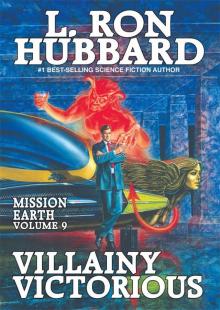 Villainy Victorious
Villainy Victorious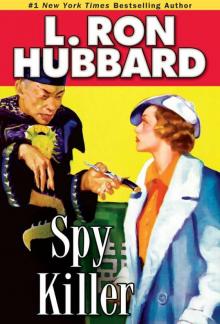 Spy Killer
Spy Killer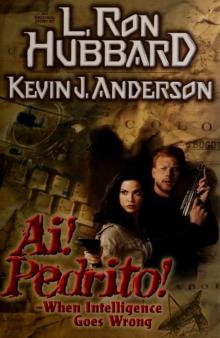 Ai! Pedrito!: When Intelligence Goes Wrong
Ai! Pedrito!: When Intelligence Goes Wrong The Dangerous Dimension
The Dangerous Dimension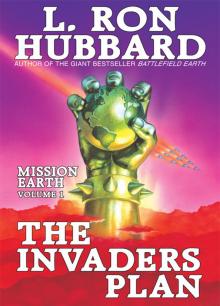 Mission Earth Volume 1: The Invaders Plan
Mission Earth Volume 1: The Invaders Plan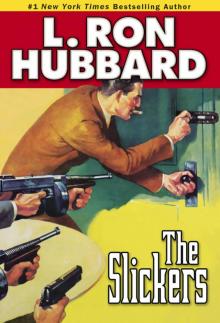 The Slickers
The Slickers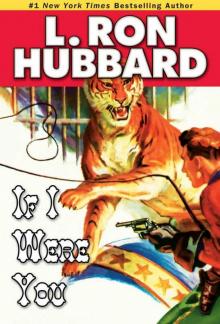 If I Were You
If I Were You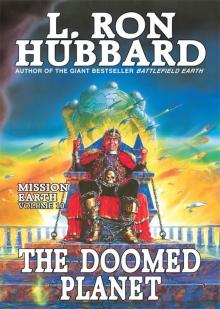 The Doomed Planet
The Doomed Planet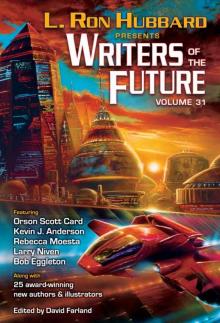 Writers of the Future Volume 31
Writers of the Future Volume 31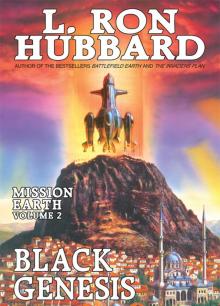 Mission Earth Volume 2: Black Genesis
Mission Earth Volume 2: Black Genesis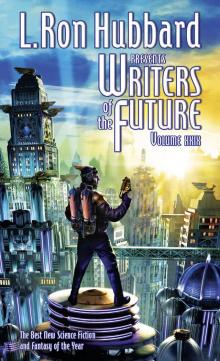 Writers of the Future: 29
Writers of the Future: 29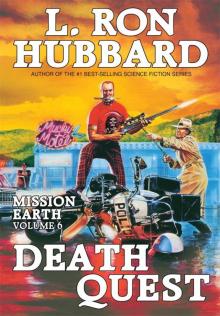 Death Quest
Death Quest The Enemy Within
The Enemy Within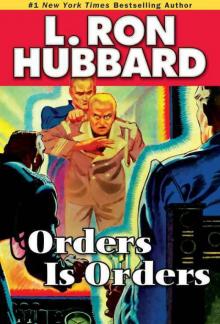 Orders Is Orders
Orders Is Orders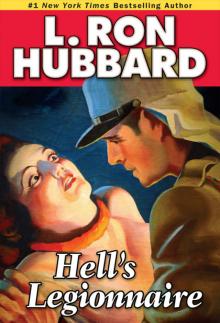 Hell's Legionnaire
Hell's Legionnaire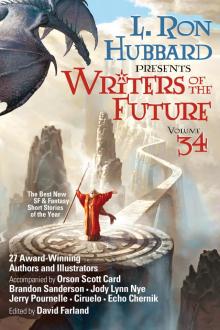 L. Ron Hubbard Presents Writers of the Future 34
L. Ron Hubbard Presents Writers of the Future 34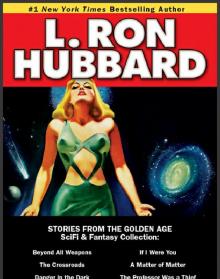 The Scifi & Fantasy Collection
The Scifi & Fantasy Collection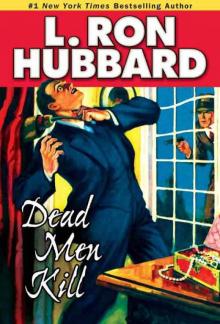 Dead Men Kill
Dead Men Kill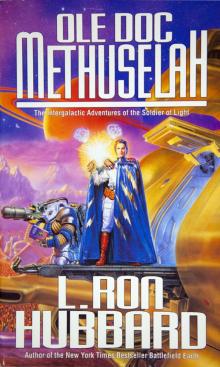 Ole Doc Methuselah: The Intergalactic Adventures of the Soldier of Light
Ole Doc Methuselah: The Intergalactic Adventures of the Soldier of Light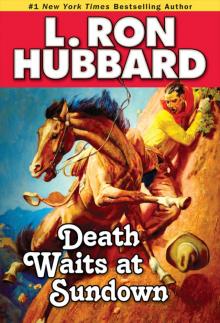 Shadows From Boot Hill
Shadows From Boot Hill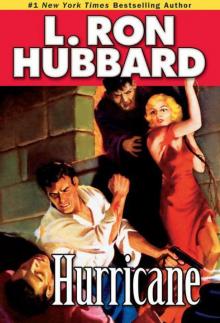 Hurricane
Hurricane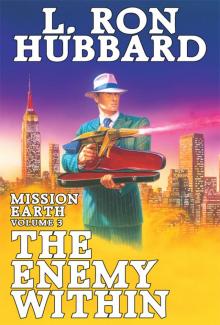 Mission Earth Volume 3: The Enemy Within
Mission Earth Volume 3: The Enemy Within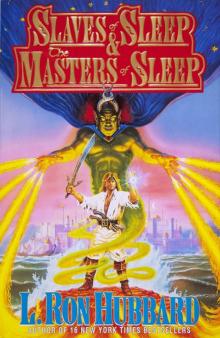 Slaves of Sleep & the Masters of Sleep
Slaves of Sleep & the Masters of Sleep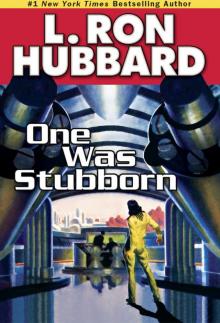 One Was Stubborn
One Was Stubborn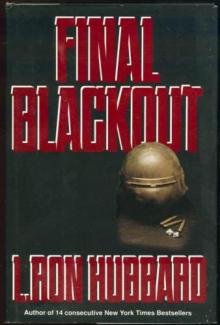 Final Blackout: A Futuristic War Novel
Final Blackout: A Futuristic War Novel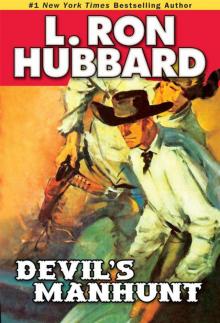 Devil's Manhunt
Devil's Manhunt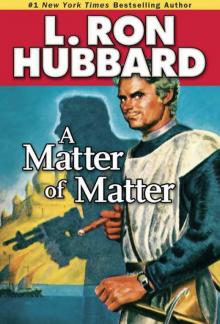 A Matter of Matter
A Matter of Matter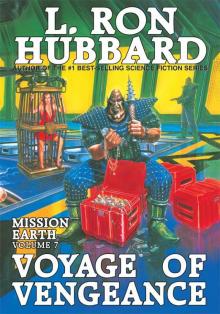 Voyage of Vengeance
Voyage of Vengeance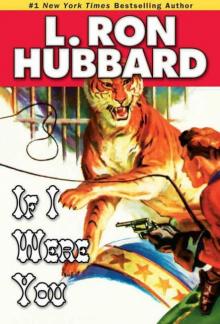 If I Were You (Science Fiction & Fantasy Short Stories Collection)
If I Were You (Science Fiction & Fantasy Short Stories Collection)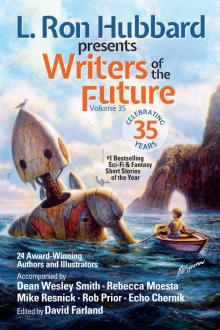 L. Ron Hubbard Presents Writers of the Future Volume 35
L. Ron Hubbard Presents Writers of the Future Volume 35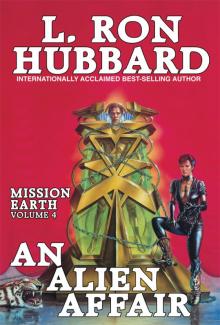 Mission Earth Volume 4: An Alien Affair
Mission Earth Volume 4: An Alien Affair Black Genesis
Black Genesis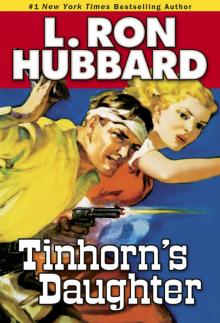 Tinhorn's Daughter
Tinhorn's Daughter Trouble on His Wings
Trouble on His Wings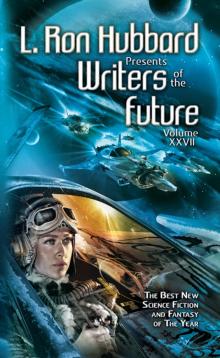 Writers of the Future Volume 27: The Best New Science Fiction and Fantasy of the Year
Writers of the Future Volume 27: The Best New Science Fiction and Fantasy of the Year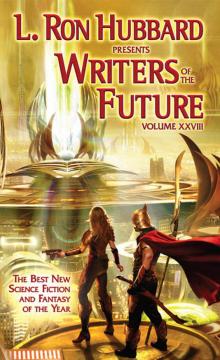 Writers of the Future Volume 28: The Best New Science Fiction and Fantasy of the Year
Writers of the Future Volume 28: The Best New Science Fiction and Fantasy of the Year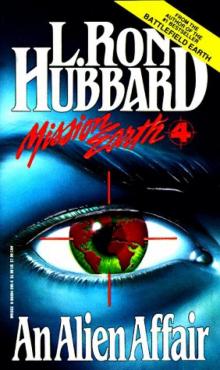 An Alien Affair
An Alien Affair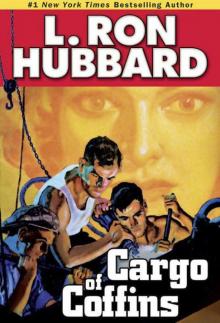 Cargo of Coffins
Cargo of Coffins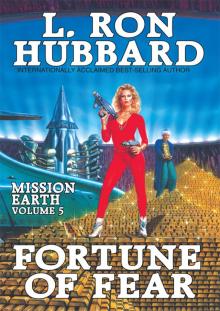 Mission Earth Volume 5: Fortune of Fear
Mission Earth Volume 5: Fortune of Fear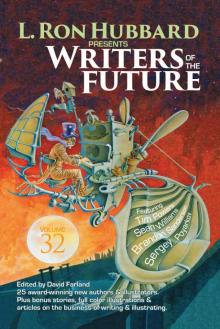 Writers of the Future 32 Science Fiction & Fantasy Anthology
Writers of the Future 32 Science Fiction & Fantasy Anthology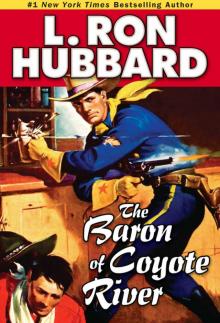 The Baron of Coyote River
The Baron of Coyote River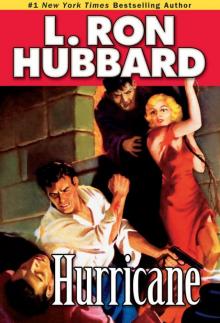 Hurricane (Stories From the Golden Age)
Hurricane (Stories From the Golden Age) Dianetics: The Modern Science of Mental Health
Dianetics: The Modern Science of Mental Health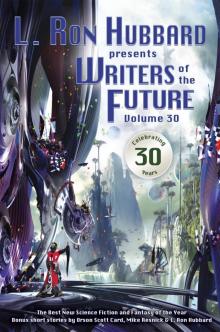 Writers of the Future, Volume 30
Writers of the Future, Volume 30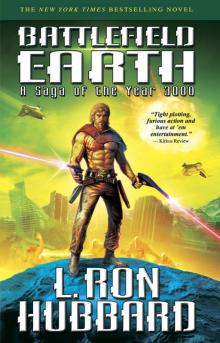 Battlefield Earth: A Saga of the Year 3000
Battlefield Earth: A Saga of the Year 3000 Fear
Fear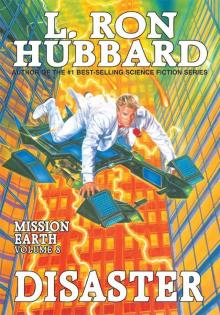 Disaster
Disaster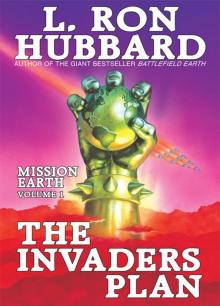 Invaders Plan, The: Mission Earth Volume 1
Invaders Plan, The: Mission Earth Volume 1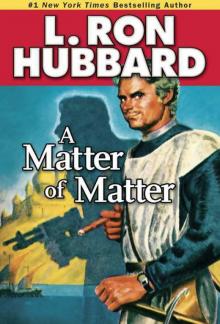 A Matter of Matter (Stories from the Golden Age)
A Matter of Matter (Stories from the Golden Age)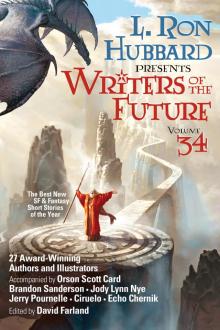 Writers of the Future Volume 34
Writers of the Future Volume 34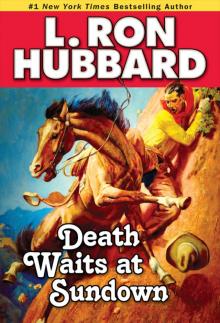 Death Waits at Sundown
Death Waits at Sundown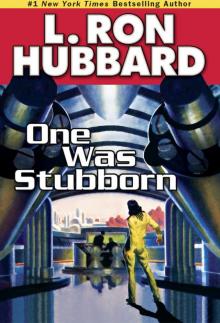 One Was Stubbron
One Was Stubbron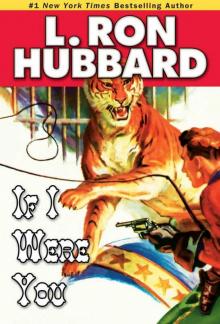 If I Were You (Stories from the Golden Age)
If I Were You (Stories from the Golden Age)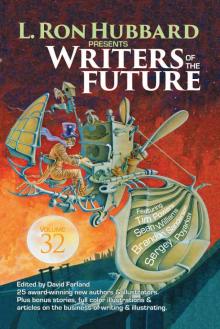 Writers of the Future 32 Science Fiction & Fantasy Anthology (L. Ron Hubbard Presents Writers of the Future)
Writers of the Future 32 Science Fiction & Fantasy Anthology (L. Ron Hubbard Presents Writers of the Future)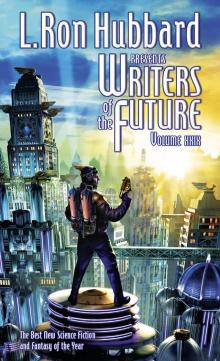 Writers of the Future, Volume 29
Writers of the Future, Volume 29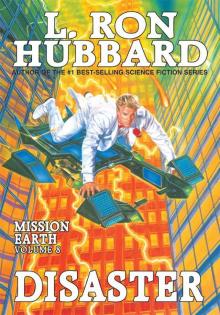 Mission Earth Volume 8: Disaster
Mission Earth Volume 8: Disaster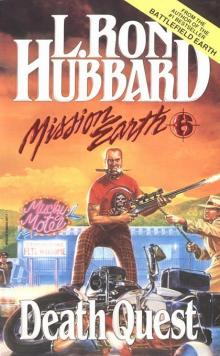 Mission Earth 6: Death Quest
Mission Earth 6: Death Quest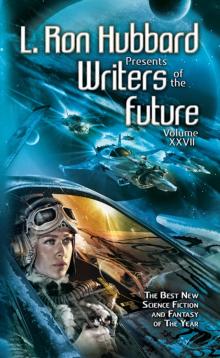 Writers of the Future, Volume 27
Writers of the Future, Volume 27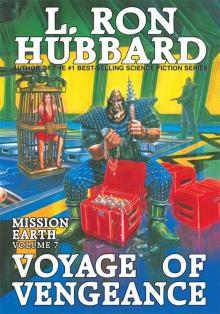 Mission Earth Volume 7: Voyage of Vengeance
Mission Earth Volume 7: Voyage of Vengeance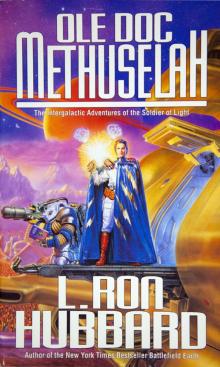 Ole Doc Methuselah
Ole Doc Methuselah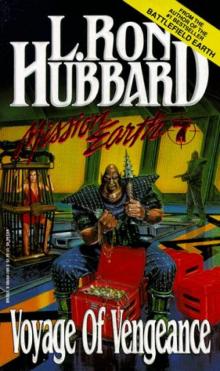 Mission Earth 07: Voyage of Vengeance
Mission Earth 07: Voyage of Vengeance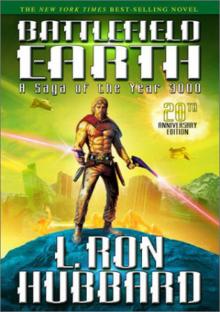 Battlefield Earth
Battlefield Earth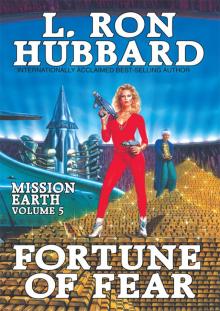 Fortune of Fear
Fortune of Fear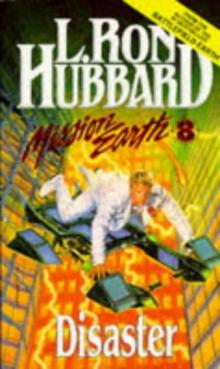 Mission Earth 8: Disaster
Mission Earth 8: Disaster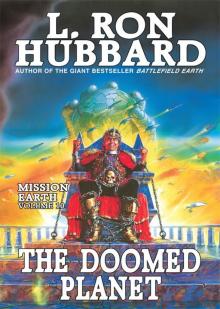 Mission Earth Volume 10: The Doomed Planet
Mission Earth Volume 10: The Doomed Planet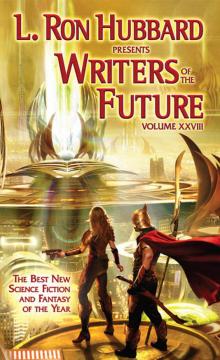 Writers of the Future, Volume 28
Writers of the Future, Volume 28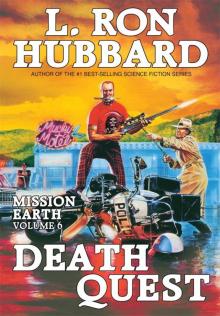 Mission Earth Volume 6: Death Quest
Mission Earth Volume 6: Death Quest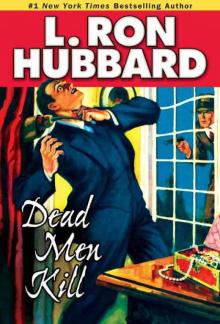 Dead Men Kill (Stories from the Golden Age)
Dead Men Kill (Stories from the Golden Age)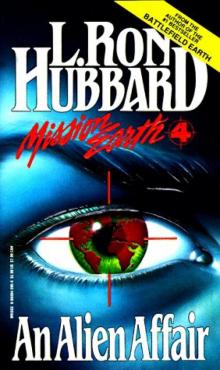 Mission Earth 4: An Alien Affair
Mission Earth 4: An Alien Affair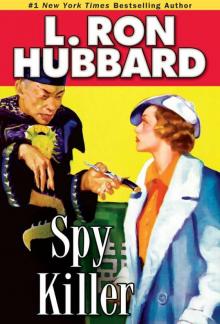 Spy Killer (Stories from the Golden Age)
Spy Killer (Stories from the Golden Age)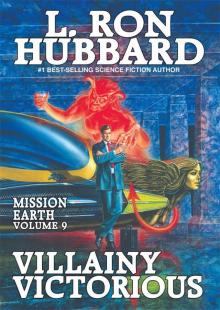 Mission Earth Volume 9: Villainy Victorious
Mission Earth Volume 9: Villainy Victorious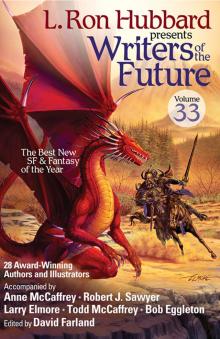 L. Ron Hubbard Presents Writers of the Future, Volume 33
L. Ron Hubbard Presents Writers of the Future, Volume 33